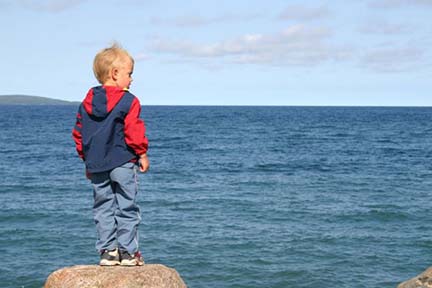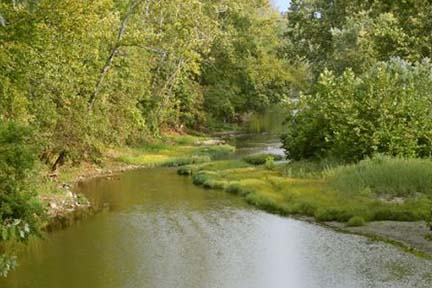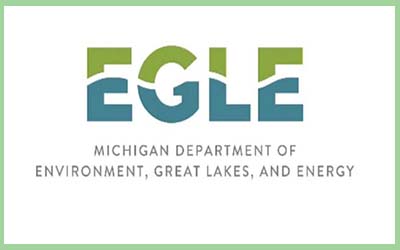FOR IMMEDIATE RELEASE
June 2, 2022
Jeff Johnston, public information officer, [email protected], 517-231-9304
Great Lakes and Fresh Water Week, June 4-12, celebrates Michigan’s ‘water champions’
Commemorations include water use webinar, grant announcements, free fishing weekend
The Great Lakes and Michigan’s abundant freshwater resources have tremendous value to Michiganders. Coming up June 4-12, the annual celebration of Great Lakes and Fresh Water Week focuses on becoming “water champions” – inspiring people to champion the health of this vital ecosystem and to enjoy, appreciate, and safeguard it for current and future generations.
Michigan is home to more than 3,200 miles of coastline along four Great Lakes, 11,000 inland lakes and ponds, 36,000 miles of rivers and streams, and enough groundwater to fill Lake Michigan over again. More than 30 million people in the U.S. and Canada rely on the Great Lakes for their drinking water.
“Michiganders share a special bond as stewards of the world’s largest freshwater system,” said Gov. Gretchen Whitmer, who dedicated the week in a proclamation. “Great Lakes and Fresh Water Week reminds us that this irreplaceable resource powers our lives, our livelihoods, and the ecosystems around us. Being a Michigan water champion means understanding our responsibility to work together to find solutions and overcome challenges such as aging infrastructure, invasive species, extreme weather, and climate change.”
This year’s Great Lakes and Fresh Water Week follows the April 21 release of the MI Healthy Climate Plan, a broad vision for Michigan’s prosperous clean energy future and economywide carbon neutrality by 2050. Gov. Whitmer commissioned the plan, which calls for protecting state land and water.
More recently, Michigan’s Department of Environment, Great Lakes, and Energy (EGLE) hosted a virtual Great Lakes Water Infrastructure Conference, May 10-11, focused on solutions to challenges faced by the Great Lakes region. Recorded sessions from the conference are available on the website.
These latest actions harken back to the MI Clean Water Plan released in 2020 and providing $500 million in funding to help local municipalities upgrade drinking water and wastewater infrastructure.
“By building a shared understanding of how water conservation, water infrastructure, energy, and climate are connected, we can strengthen our collective efforts and protect the health and sustainability of our water resources,” said EGLE Director Liesl Clark. “We want future generations to enjoy the same experiences we do in the Great Lakes State: swimming, boating, fishing, sightseeing, and more.”
EGLE and its Office of the Great Lakes (OGL) partner with the Michigan Department of Natural Resources (DNR), the Southeast Michigan Council of Governments (SEMCOG), and the MiSTEM Network at the Michigan Department of Labor and Economic Opportunity (LEO) to sponsor Great Lakes and Fresh Water Week.
“The celebration of Fresh Water Week takes on even more meaning this year, as we mark the 75th anniversary of the Michigan State Waterways Commission and all of the work done to make the state’s Great Lakes, rivers, and inland lakes more accessible for better boating adventures,” said DNR Director Dan Eichinger. “Michigan’s freshwater resources, in large part, define what it means to live in this state, and the DNR remains committed to protecting and managing these resources that provide the backdrop for amazing recreation experiences you won’t find anywhere else.”
SEMCOG Executive Director Amy O’Leary agreed.
“Southeast Michigan’s Great Lakes shoreline and our inland lakes and streams are among our most prized regional assets,” O’Leary said. “The health and sustainability of our waters are supported by an army of water champions, including our state and federal partners, the Great Lakes Water Authority, local governments, educators, gardeners, anglers, paddlers, nature lovers, nonprofit partners such as watershed organizations, and so many more. If you want to learn more about how to be a water champion in your Southeast Michigan community, visit miOneWater.org.”
There are many ways to participate in Great Lakes and Fresh Water Week:
- Visit EGLE on Facebook for news and info from the department. A video June 6 by EGLE Director Liesl Clark will highlight Michigan water champions and the opportunity to share how you and those you know live out water champion principles.
- Virtually attend a webinar titled “Water: We are the Champions,” part of SEMCOG’s One Water webinar series, at 1 p.m. Monday, June 6. Presenters from SEMCOG, EGLE, and the Great Lakes Water Authority will discuss what it means to be a water champion. Register on SEMCOG’s website or watch the presentation live on SEMCOG’s Facebook page.
- Virtually attend an EGLE webinar titled “How Michigan’s Water Use Program Preserves and Manages our Water Resources” at 1 p.m. Tuesday, June 7, to learn why Michigan has water use regulations, how they work, and what they mean for the state’s residents, industries, and future generations. Register on EGLE’s website.
- Tease your brain with daily Great Lakes trivia, posted to the DNR’s Mi Nature Facebook page and at EGLE’s Twitter feed June 6-10.
- Fish for free June 11-12. On these two days, the DNR will waive the need for a fishing license, as well as off-road vehicle license, trail permit, and the Recreation Passport requirement for admission to state parks and boating access sites.
- Settle in at the beach with a great summer read like the 2021 State of the Great Lakes report.
- Enjoy the outdoors safely and sustainably by following tips for responsible recreation in and around Michigan waterways.
- Teachers, explore the From Students to Stewards toolkit for place-based educational resources that will instill a desire to learn about water resources and protect our lakes and streams.
- Public officials, study up on issues around drinking water infrastructure investments and resources available to your communities. Check the Michigan Municipal League Foundation’s MI Water Navigator website as a guide to navigating infrastructure funding opportunities.
- Watch the Department of Labor and Economic Opportunity’s (LEO) MiSTEM Network website June 8 for the announcement of grant recipients from a combined $200,000 allocated by LEO and EGLE in February. The grants, a continuation of the 2020 From Students to Stewards Initiative and 2021 MiSTEM Transformative Playbook grants, will boost freshwater literacy programs and access to real-world STEM experiences for Michigan K-12 students.
More details about the week are available on the OGL’s Stewarding the Great Lakes webpage, including links to local events, videos, educational resources on topics such as invasive species identification and proper disposal of old medications, and information on how to volunteer with the Michigan Clean Water Corps. |




